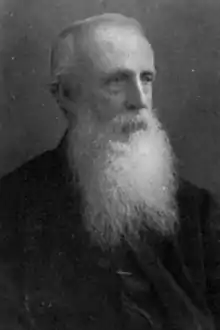Octavius Pickard-Cambridge
The Reverend Octavius Pickard-Cambridge FRS (3 November 1828 – 9 March 1917) was an English clergyman and zoologist.
Octavius Pickard-Cambridge | |
|---|---|
 The Rev. O. Pickard-Cambridge, around 1891 | |
| Born | 3 November 1828 |
| Died | 9 March 1917 (aged 88) |
| Nationality | British |
| Education | University of Durham |
| Occupation | clergyman and zoologist |
| Spouse(s) | Rose Wallace |
Pickard-Cambridge was born in Bloxworth rectory, Dorset, the fifth son of Revd George Pickard, rector and squire of Bloxworth: the family changed its name to Pickard-Cambridge in 1848. Octavius was tutored at home by William Barnes, then studied theology at the University of Durham. He was ordained in 1858, succeeding his father at Bloxworth in 1868. In 1857 he presented the Pickard-Cambridge Challenge Cup to University College Boating Club, University of Durham for a skiff race; it was re-presented in 1895 for college second trial fours.[1]
His main interest was in spiders, though he wrote also on birds and lepidoptera (butterflies and moths). This passion for arachnids was probably fostered in 1854 in which year he both accompanied the entomologist Frederick Bond on a visit to the New Forest in Hampshire and was introduced to the writings of the arachnologist John Blackwall, with whom he struck up a correspondence, meeting for the first time in 1860. Pickard-Cambridge assisted Blackwall between 1861 and 1864 in the publication of Blackwell's great work, British and Irish Spiders.
Pickard-Cambridge himself published extensively on spiders between 1859 and his death in 1917, his major work being the volume on arachnids in the Biologia Centrali-Americanii between 1883 and 1902. Of his other works, The Spiders of Dorset was perhaps his best-known, much of his other writing being in the form of papers in The Zoologist, the journals of the Linnean Society and the Zoological Society, and in the Proceedings of the Dorset Natural History and Antiquarian Field Club. He became a world authority on spiders, describing a considerable number of new species including the Costa Rican redleg tarantula (Megaphobema mesomelas) and the Sydney funnel-web spider (Atrax robustus).
He was elected a Fellow of the Royal Society on 9 September 1887. On his death, his collection and library were bequeathed to the University of Oxford and is now held by Oxford University Museum of Natural History.
Pickard-Cambridge married Rose Wallace in 1866, and they had six sons. Among them were the classicist and composer William Adair Pickard-Cambridge (1879–1957) and the classicist Sir Arthur Wallace Pickard-Cambridge (1873–1952), one of the greatest authorities on the Greek theatre in the first half of the 20th century. His nephew, Frederick Octavius Pickard-Cambridge, (1860–1905) was also a noted arachnologist.
Works
| Wikimedia Commons has media related to Octavius Pickard-Cambridge. |
- "Arachnida", in Encyclopædia Britannica, 9th Edition, Volume II (Edinburgh, 1875)
- The Spiders of Dorset: From the 'Proceedings of the Dorset Natural History and Antiquarian Field Club.' (Sherbourne, 1879–82)
- Araneidea. Scientific Results of the Second Yarkand Mission. (Calcutta, 1885)
- Monograph of the British Phalangidea or Harvest-Men. (Dorchester, 1890)
References
Further reading
- Castellum 2006: alumnus newsletter of the University College, Durham. Contains an article entitled 'It's squirrels for luncheon, Sir' (p. 38–47) with extensive biographical notes and images.
- Pickard-Cambridge, Arthur Wallace, Sir (1918). Memoir of the Reverend Octavius Pickard-Cambridge. Oxford: Printed for private circulation.
- "Obituary Notices of Fellows Deceased". Proceedings of the Royal Society of London. Series B, Containing Papers of a Biological Character. Royal Society. 91 (641): i–liii. 15 November 1920. JSTOR 80995.
- Biography of Octavius Pickard-Cambridge at the S2A3 Biographical Database of Southern African Science